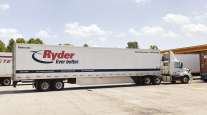Managing Editor, Features and Multimedia
Ryder Introduces TranSync Platform to Automate Fleet-Selection Process

Ryder System Inc. has developed a technology platform designed to help private fleets and shippers determine the most efficient transportation option for a particular load at a given time.
Ryder TranSync uses a software model to automatically calculate if a company should use its private or dedicated fleet or a common carrier to move a shipment — a decision that many transportation managers continue to make manually with limited information.
Each day, the system looks at lane rates but also considers other key factors such as the availability of capacity and drivers, backhaul opportunities for the private fleet and fuel costs to determine the option with the lowest total cost within the user’s supply chain network, Ryder said.
The company built the technology platform to “fill in the gaps” in its customers’ transportation networks, John Diez, president of Ryder Dedicated Transportation Solutions, told Transport Topics.
“We continue to realize that there are still more opportunities for private-fleet operators who also use common carriers to optimize their networks even further,” Diez said.
TranSync is available to Ryder customers using the company’s dedicated or transportation management services.
Diez said Ryder will consult with customers to set up the data inputs for the platform, which runs on customers’ back-office systems.
Clients will have full transparency to the calculated costs of each transportation option, enabling them to validate the results, Diez said.
He said a key target audience for this technology would be companies that run their own private fleets but also use common carriers for surge capacity or to cover additional territory.
Over time, customers will be able to use the tool to make informed decisions on equipment replacement and calibrate the size of their private fleets.
“This affords you the analytics to make those decisions and be continually planning ahead,” Diez said.
Ryder collaborated with the University of Tennessee to research the market’s need for the technology and help develop the mathematical model that drives the software tool.
The university conducted a survey of transportation managers to learn about their fleet-selection practices and gauge their need for a software tool that automates those choices.
Of the 101 respondents, 74% said their firm used a combination of private or dedicated transportation and common carriers for their outbound shipments.
However, only 28% said the process they use to assign shipments to internal transportation resources or common carriers is fully automated, and 20% said they use a mix of manual and automatic processes.
“Over half of the transportation managers that we talked to said they’re still making decisions manually about using dedicated versus common,” said John Bell, assistant professor of supply chain management at UT and co-author of the survey.
Lance Saunders, a visiting professor who also worked on the project, said the existing software models that fleet managers were using to make those choices were based on cost and ignored other factors such as asset utilization and getting drivers back home at night.
“A lot of those factors were just as important to transportation managers,” he said.
Miami-based Ryder System’s Supply Chain Solutions segment ranks No. 11 on the Transport Topics Top 100 list of the largest U.S. and Canadian for-hire carriers.



